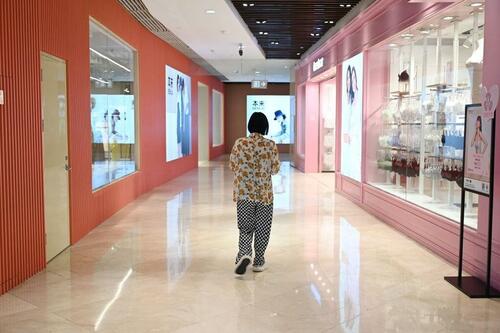
6 факторов, которые характеризуют нынешнее состояние Китая
Автор: Александр Ляо, The Epoch Times
По мере того, как мы достигаем середины 2025 года, очевидно, что этот год характеризуется турбулентностью, неопределенностью и углубляющимся отчаянием для многих в коммунистическом Китае.
Шесть явлений лучше всего отражают текущее состояние страны: упадок, жесткая конкуренция, политическая борьба, движение «беги», случайные акты насилия и движение «лежачих квартир».

Они показывают эрозию доверия и растущее чувство разочарования и волнений среди населения.
снижение
Для многих в Китае 2025 год является самым сложным годом за почти три десятилетия, при этом многие сектора общества испытывают значительный спад. Рынок недвижимости является наиболее заметным примером.
К концу мая средние цены на жилую землю упали почти на 50% в городах второго уровня и почти на 40% в городах третьего уровня. Эти цены рассчитываются путем деления общей стоимости земли на общую площадь, которая может быть законно построена, обеспечивая меру стоимости приобретения земли для застройщиков.
Местные органы власти, в значительной степени зависящие от продажи земли для получения дохода, увидели, что этот жизненно важный поток почти исчез.
Экономический спад проявляется в снижении потребительских расходов. Признаки сокращения внутреннего спроса включают ценовые войны в секторе электромобилей, повсеместное закрытие малого бизнеса и снижение продаж предметов роскоши, таких как косметика, высококачественные часы и дизайнерские сумки. Кроме того, многие иностранные компании либо сокращают свою деятельность, либо вообще покидают страну.
Сокращение заработной платы затронуло сотрудников в различных секторах, включая банки, компании по ценным бумагам, гражданские службы, а также государственные и частные предприятия. Кроме того, уровень безработицы среди недавних выпускников колледжей растет, что заставляет многих людей предвидеть безработицу после окончания учебы.
Однако наиболее значительный спад связан не с экономикой, а с доверием общественности к режиму. Среди рядовых граждан и правительственных чиновников многие потеряли надежду в Коммунистической партии Китая (КПК). Никакая оптимистическая риторика или экономические стимулы не могут изменить эту ситуацию. Эрозия доверия вызвала бегство капитала и уход с фондового рынка, что, возможно, стало самым большим кризисом легитимности, с которым когда-либо сталкивалась КПК.
Жесткая конкуренция
Чрезмерная конкуренция в одной и той же отрасли была давней проблемой при коммунистическом правлении, что привело к внутренней борьбе и истощению.
В этом году наблюдается заметный рост закрытия различных предприятий, включая рестораны, парикмахерские, магазины пузырчатого чая, салоны красоты и автосалоны. Хотя экономический спад является важным фактором, внутренняя конкуренция также играет жизненно важную роль. Слишком много компаний борются за ограниченный спрос, что побудило их подрывать друг друга все более неустойчивыми способами. В результате многие борются, что в конечном итоге приводит к остановкам, а ухудшение экономики только ухудшило эту ситуацию.
Политическая борьба и борьба
Борьба между высшими должностными лицами КПК является одним из наиболее чувствительных и последовательных событий в этом году, особенно очевидно в продолжающейся военной чистке.
То, что началось в конце 2023 года как широкомасштабное подавление Ракетных войск, первоначально нацеленное на высокопоставленных чиновников, считающихся нелояльными китайскому лидеру Си Цзиньпину, резко изменилось во второй половине 2024 года. В поразительном развороте последние чистки были нацелены на союзников Си, предполагая ослабление его власти.
По словам заслуживающих доверия инсайдеров, разговаривающих с зарубежными китайскими диссидентами, роль Си теперь стала в значительной степени церемониальной. Растет число признаков того, что высшие должностные лица КПК достигли консенсуса: Вскоре Си будет официально отстранен от власти.
Этот неожиданный сдвиг власти стал определяющей чертой политического ландшафта Китая в 2025 году.
Движение «Бег»
Эта ситуация описывает растущую тенденцию китайских граждан, пытающихся покинуть страну любыми доступными средствами.
После драконовских трехлетних запретов КПК на COVID-19 все большее число людей стремились эмигрировать в Соединенные Штаты, а некоторые даже незаконно пересекали ее южную границу пешком. Но с возвращением президента Дональда Трампа в Белый дом этот путь в значительной степени закрыт.
В последние годы некоторые китайцы также пытались поселиться в Канаде, просрочив туристические визы и обратившись за политическим убежищем. Канада ужесточила визовую политику.
Теперь Таиланд и Малайзия стали новыми направлениями для китайцев со средним доходом, надеющихся присоединиться к движению «беги».
Для состоятельных людей Япония становится все более привлекательным направлением по сравнению со многими западными странами благодаря относительно доступной визе бизнес-менеджера.
Эта виза не требует владения японским языком, академической квалификации или возрастных ограничений. Вместо этого заявители должны инвестировать не менее 5 миллионов иен (около 35 000 долларов США) в японскую компанию, зарегистрировать бизнес и обеспечить физическое офисное пространство.
Кроме того, предприятие должно нанять по крайней мере одного штатного сотрудника, который является гражданином Японии, постоянным жителем, супругом или ребенком гражданина Японии или постоянного жителя, или иностранного гражданина с долгосрочным статусом резидента. Заявители могут привезти членов своей семьи, если их бизнес-план будет одобрен.
Несмотря на социально-экономический статус, многие китайцы покидают страну. Эта тенденция подчеркивает мрачную реальность репрессивного управления, когда растущее давление заставляет людей принимать решительные меры.
Случайные акты насилия
Еще одним тревожным явлением является рост случайных нападений за последние два года.
Многие китайцы, попавшие в ловушку непреодолимых трудностей или ставшие жертвами несправедливости, не имеют выхода для своих обид. К сожалению, насилие часто возникает, когда они набрасываются в попытке выразить свою боль. С этим могут быть связаны следующие события.
27 января в Бочжоу, провинция Аньхой, седан ворвался в толпу, ранив несколько человек.
Затем, 23 марта, мужчина совершил нападение с ножом возле супермаркета в Шаосин, провинция Чжэцзян, случайно нацелившись на прохожих. По сообщениям, несколько человек получили ранения. Интернет-пользователь разместил видео инцидента в социальных сетях, которые могут беспокоить некоторых зрителей (ссылка).
Всего несколько дней спустя, 26 марта, в Аньяне, провинция Хэнань, такси беспорядочно ехало по дороге, нанося удары по пешеходам и транспортным средствам. Некоторые источники утверждали, что погибли пешеходы и продовольственные курьеры. Интернет-пользователь опубликовал видео в социальных сетях, которое может беспокоить некоторых зрителей (ссылка).
Власти быстро подвергли цензуре информацию об этих инцидентах.
«Lying Flat» ?
Это движение, инициированное молодыми людьми в Китае в последние годы, является ответом на социальное выгорание, когда люди выходят из конкурентного безумия и принимают более медленный, минималистский образ жизни.
Появился новый термин, описывающий людей, которые доводят понятие «лежачая квартира» до крайности: молодежь «Пять носов». Эти люди сознательно предпочитают не покупать дом или машину, избегать ненужных покупок и отказаться от брака и детей. Основное внимание уделяется максимальному минимизации расходов.
По мере того, как экономика продолжает ухудшаться, этот пассивный уход от социальных ожиданий становится все более распространенным. По сути, китайское общество потеряло свою жизненную силу.
Нет надежды на восстановление в соответствии с правилами КПК
Эти страдания являются результатом десятилетий коммунистического правления в сочетании с постоянно ослабляющейся экономикой.
КПК надеялась стимулировать экономику, опираясь на модель внутреннего обращения, поощряя людей тратить оставшиеся сбережения. Однако эта стратегия потерпела неудачу, поскольку Китаю не хватает надежной системы социального обеспечения. Люди, зарабатывающие меньше, слишком боятся тратить. Следовательно, потребление застопорилось, а экономика погрузилась в глубокую стагнацию.
В результате все достижения, достигнутые за годы реформ и открытости, на сегодняшний день исчерпаны.
Кроме того, модель управления КПК наносит ущерб обществу, особенно во времена кризиса. Ошибочные попытки цепляться за власть, такие как реализация драконовской политики нулевого COVID во время пандемии, принятие дипломатии воина-волка и разрешение неконтролируемого роста пузыря на рынке недвижимости, нанесли серьезный ущерб китайскому обществу.
Хуже того, партия подорвала моральный компас Китая. Нечестность, предательство и оппортунизм становятся все более распространенным явлением, что приводит к повсеместной атмосфере взаимного недоверия в повседневной жизни. В 2025 году последствия этой многолетней деградации достигли критической точки.
Если КПК продолжит свое правление, обычные граждане столкнутся со все более трудными годами.
Мнения, выраженные в данной статье, являются мнениями автора и не обязательно отражают взгляды The Epoch Times или ZeroHedge.
Тайлер Дерден
Thu, 07/10/2025 - 23:25















